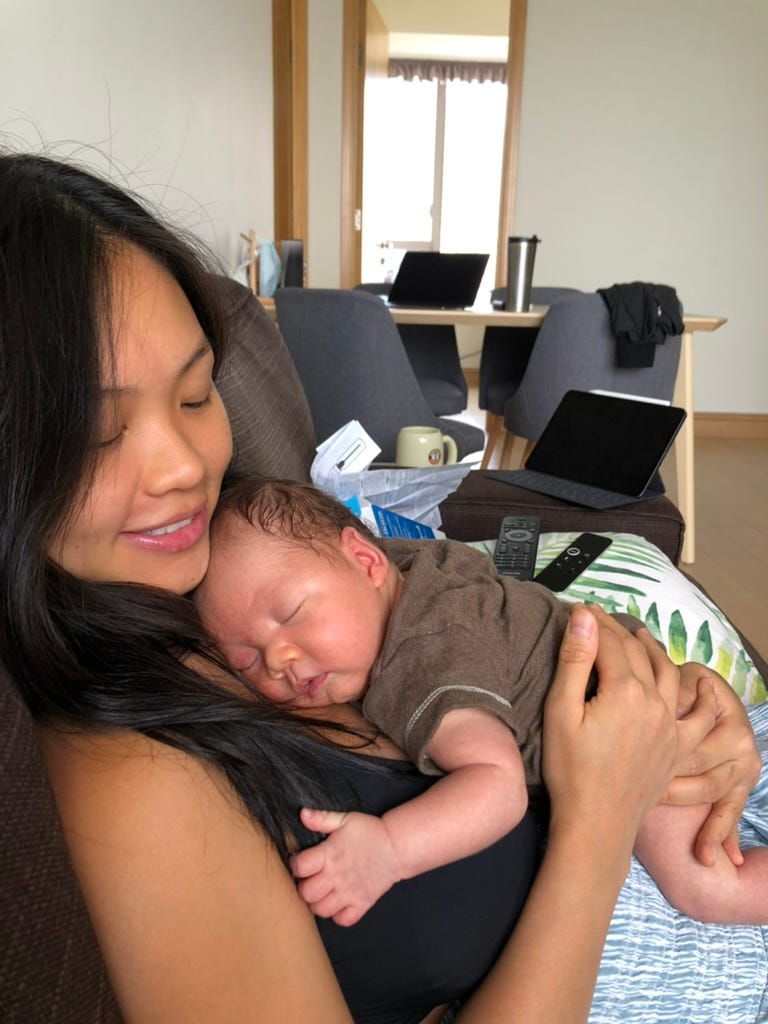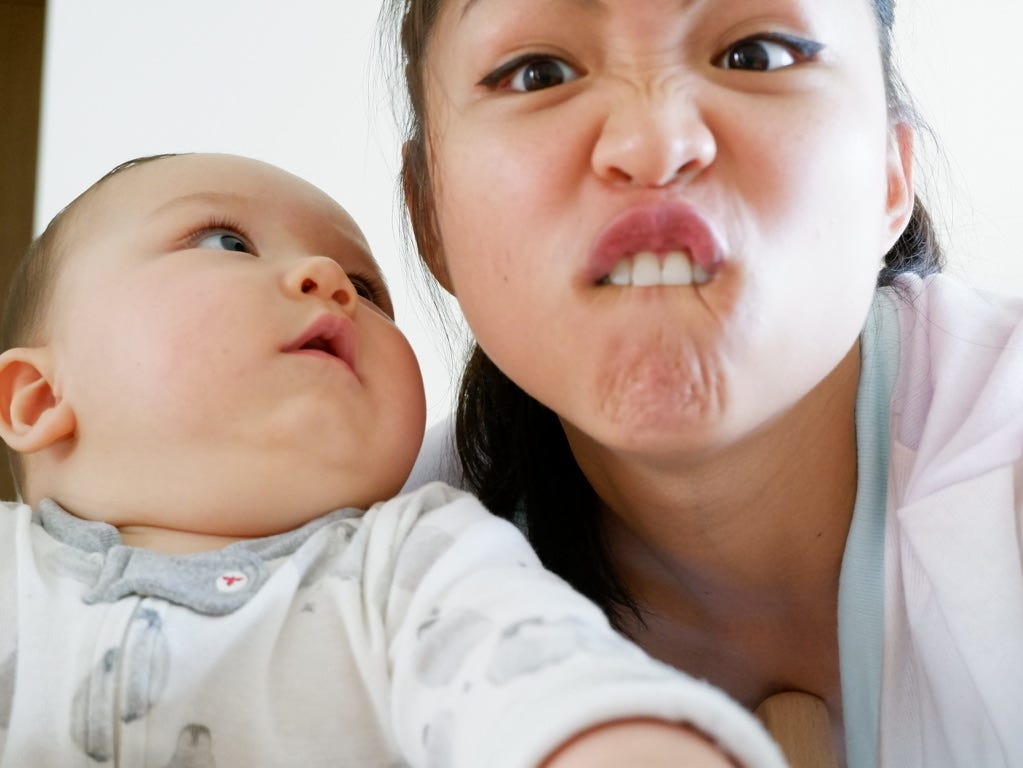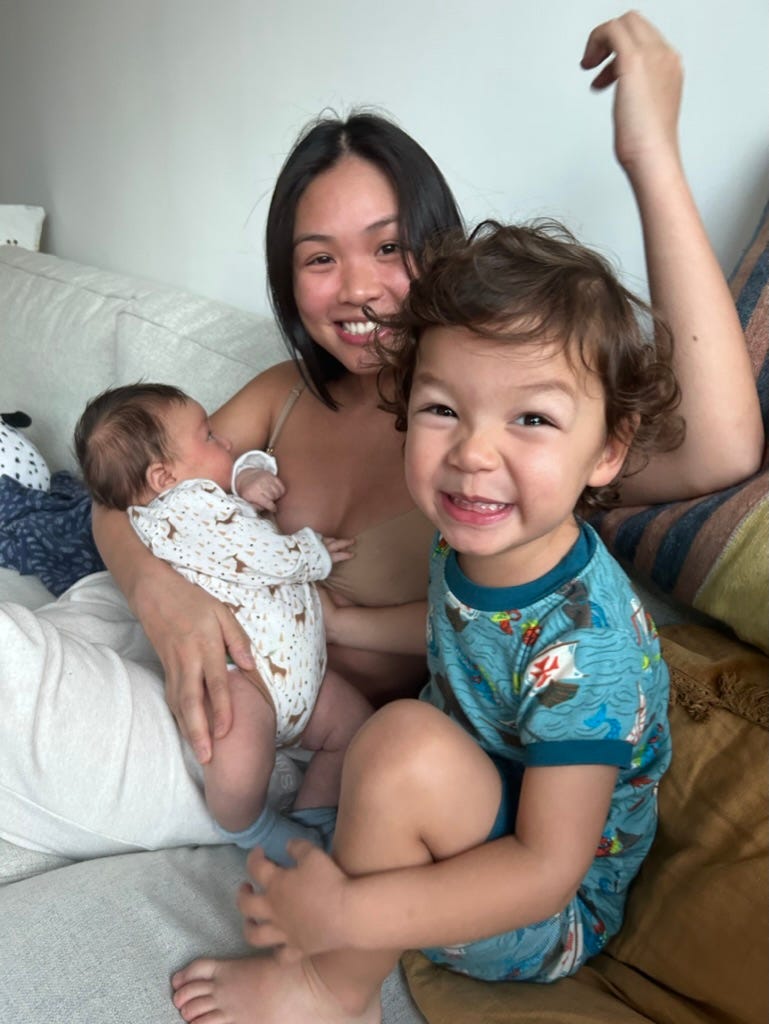Motherhood Identity Series with Claire Mercieca, founder of Embrace
How one former lawyer turned postpartum frustration into a global brand—and found herself in the process.
When Claire Mercieca became a mother at 27, she quickly realized that the postpartum experience—raw, disorienting, beautiful—wasn’t being reflected in the products she was told to rely on. A former corporate lawyer turned founder, Claire launched Embrace not just to meet a market need, but to respond to a deeper maternal truth: that comfort and confidence during early motherhood shouldn’t be a luxury.
She poured $110,000 of her own savings into fabric innovation and product R&D—nearly half of it before even launching. Two babies and two years of R&D later, she brought her vision to life — bootstrapping a seven-figure brand from her home, developing a proprietary, skin-friendly fabric blend, and listening intently to the frustrations of new mothers around the world.
From late-night nursing sessions to delayed shipments, Claire built Embrace through the chaos and clarity of motherhood itself — each product a reflection of the softness, strength, and minimalism that carried her through postpartum.
In this week’s Motherhood Identity Series, Claire reflects on how becoming a mother transformed her sense of identity, how eczema and engorgement shaped her fabric philosophy, and why redefining comfort for women isn’t just about better clothes—it’s about reclaiming selfhood in the most vulnerable season of all.
You transitioned from being a practicing lawyer to founding a maternity apparel brand — how did becoming a mother reshape your professional ambitions and sense of identity?
As a lawyer, I was used to structure, long hours in the office, and a somewhat clear path forward (i.e., become a partner). But becoming a mother changed everything - as cliché as that may sound. My days were suddenly filled with feeding schedules, sleepless nights, and this deep, all-consuming love for a little and totally new human in my life.
My feelings about work changed: corporate law didn’t seem all that interesting or important enough for me to be away from my baby five days a week, 12 hours a day. I still wanted to be productive, but I decided the work I did had to be meaningful enough to justify time spent away from my family, and also allow me some semblance of a work-life balance. I found that in Embrace.
Starting this brand gave me a new sense of purpose. It helped grow new skills and channel them into something deeply personal: creating products that genuinely serve women in one of the most vulnerable, transformative times of their lives. It reshaped my ambitions from climbing a corporate ladder to building something meaningful and human, something I wish I had when I became a mom. It’s been healing in many ways — not just professionally, but in helping me reclaim parts of myself through creating for others.
When you reflect on your early postpartum days, what role did clothing and comfort play in how you felt physically and emotionally as a new mother?
What you wear isn’t just about practicality, it deeply affects how you feel. When something was uncomfortable or awkward (which most nursing bras were), it added to the sense of overwhelm (and frustration). But on the rare days I put on something that was soft and actually fit my postpartum body, it gave me a tiny sense of control and dignity in a season that often felt chaotic and vulnerable.
That experience really shaped how I approached designing for postpartum. I didn’t want to create just functional pieces: I wanted to make clothing that mothers would feel good in. Because when you’re in the thick of it, comfort isn’t a nice-to-have. It’s a form of care.
Embrace is so clearly rooted in listening to mothers across the globe. How did hearing other women’s frustrations validate your own experiences — and push you to keep going?
Hearing from other mothers was comforting, motivating, and almost frustrating in a sense to realize how widespread the problem was. Before we conducted our survey, there was definitely a small seed of doubt: maybe I was being too picky, or I just hadn’t found the right nursing bra yet. As I started talking to other women, I kept hearing the same frustrations: discomfort, poor fit, synthetic fabrics, and styles that didn’t reflect who they were.
Our survey results also reminded me that this wasn’t just about solving a personal pain point, it was about creating something better for all of us. Embrace has always been built on listening, and I think that’s why it resonates. When women feel heard, especially in a season as intense as new motherhood, that in itself can be powerful.
Fabric innovation became a central part of your brand’s DNA. Was there a moment when you realized that material choice wasn’t just about aesthetics, but about supporting the emotional and physical needs of postpartum women?
Yes, absolutely. I’ve struggled with severe eczema for most of my life, so I’ve always been hyper-aware of how fabrics feel against the skin. During the postpartum period, that sensitivity intensified. My body was healing and constantly overheating, and with my baby on me almost 24/7 - everything I wore had to be gentle, breathable, and hypoallergenic. Throughout my life, I had always known the importance of fabric to our emotional and physical experience—but it was heightened during the early postpartum period.
That’s why we’ve spent so much time developing our own blend—using Oeko-Tex certified non-toxic materials like Supima Cotton and Austrian Micromodal—to make sure everything we create is not only beautiful, but truly kind to the skin.
You designed Embrace to meet women where they are — sensitive skin, changing bodies, fluctuating sizes. How did your own postpartum body journey inform the details you prioritized in your designs?
When my milk came in, I went from a 32B to a 32E, and suddenly, nothing fit. Most nursing bras didn’t give me the coverage I needed. With a small band and large cup size, I was constantly spilling out in a small bra, or feeling unsupported in a large bra with a band that was too loose on me.
This made me pay attention to the sizing of our nursing collection — I made sure all our bras would fit at least an E cup. In fact, our nursing tanks and dresses with built-in support are designed to fit up to H cups.
What was the most surprising thing you learned about yourself — as a mother, woman, and founder — during the two years you spent developing Embrace before launch?
I think the most surprising thing I learned about myself was how resilient I can be. Being an entrepreneur is an emotional roller coaster, and it never ends. There are lots of lonely, unglamorous moments, especially in the early days when you’re building something from scratch with no roadmap — but you just have to keep going.
I have also learned to trust my instincts more. Everyone has an opinion on how things should be done, but at the end of the day, I had to tune out the noise and stay connected to why I started. That inner clarity has been the most valuable thing I’ve found along the way.
Minimalism is at the heart of your designs, offering an antidote to the overcomplicated aesthetics of typical nursing wear. How does this philosophy reflect how motherhood changed your approach to style and self-expression?
On the contrary, our design aesthetic reflects my style before motherhood. I’ve always leaned toward minimalism in design and quality. When I became a mother, I realized how little of that existed in maternity or nursing wear. Everything felt overly complicated, overly designed, or just not reflective of my style.
I was determined not to lose my sense of style, so I carried it forward into a space that really needed it. I wanted to create pieces that felt quiet, refined, and grounded. I believe that in the intensity of early motherhood, simplicity and quality have a way of helping you feel more at ease in your own skin.
Being self-funded and scaling Embrace globally while raising two young boys is no small feat. How do you personally define success at this stage of your motherhood and entrepreneurial journey?
Success is about building something meaningful at our own pace and lifting up my team along the way. Scaling Embrace globally while raising two young boys has been both intense and a lot of fun. The fact that I get to create something I believe in, while also being present for my kids, feels like a version of success I wouldn’t have understood before becoming a mother.
Motherhood often forces us to rethink our relationship to time, ambition, and “enoughness.” How has motherhood taught you to measure your days and achievements differently?
I’ve had to learn that doing less “work” doesn’t mean I’m doing less well. Some days, success looks like a really productive day in front of my laptop. Other days, it’s about being present with my kids and spending an afternoon playing pretend with them.
That said, in all honesty, I still struggle with balance. There are definitely some days I wish there were 30 hours in a day instead of 24.
However, I understand that success can look different depending on the day—and that’s okay.
If you could go back to Claire in 2020, freshly postpartum and frustrated with the options on the market, what would you tell her about the woman and brand she would go on to build?
I’d tell her she’s going to take that frustration and turn it into a brand that reaches women across the world. That she’ll create pieces that make other mothers feel seen, comfortable, and more like themselves again. That she’ll build it all while raising two little boys and learning, and that it’s okay not to have it all figured out. That Embrace would evolve from a maternity to a womenswear brand and that the possibilities are endless. She’s just getting started.







